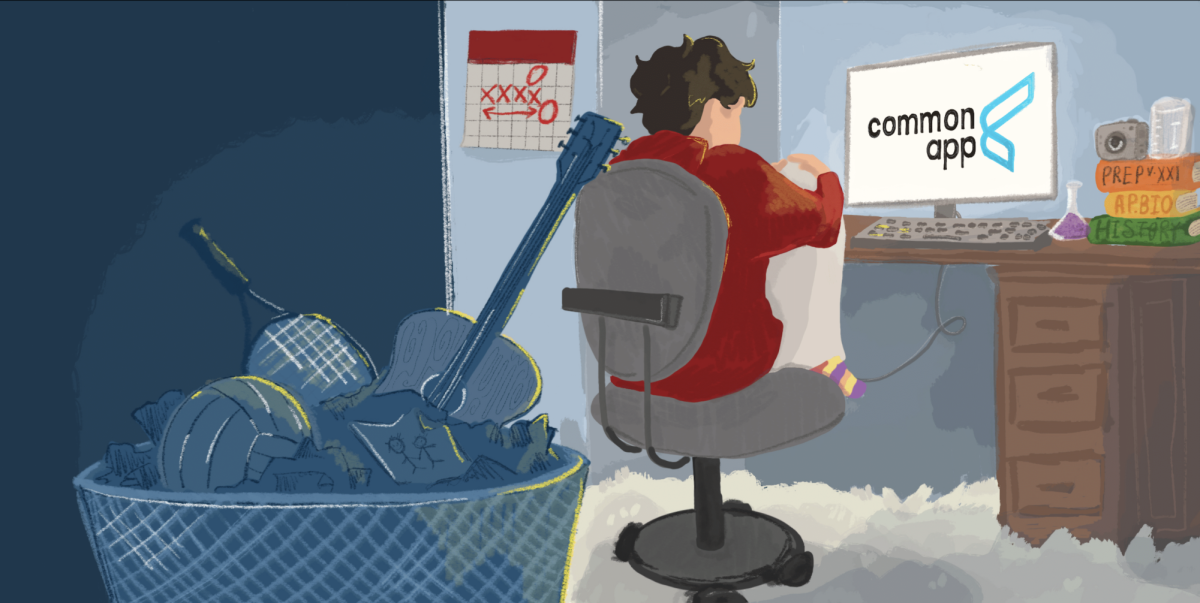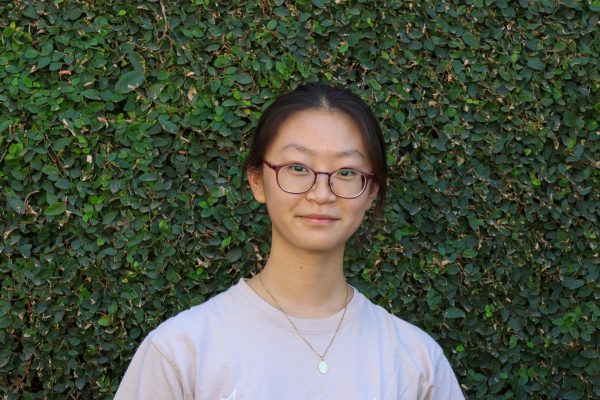Dripping in sweat with multiple bags in hand, Sarah Parmet ’25 rushes up the stairs to Rugby Auditorium after her cheer practice, barely making it in time for rehearsal for the upcoming musical. Her vision is spotted from the fluorescent lights, aggravating her pounding headache. Exhausted from cheer practice and gasping for breath, she repeatedly struggles to remember her lines, slowly irritating her peers.
During a break after a rough run-through, she sits backstage with her head in her hands and thinks about the mountain of homework ahead, promising another all-nighter due to her schedule. With a sigh of defeat, Parmet realizes she will not be able to keep up with her schoolwork unless something changes. She must decide between the two activities she loves: cheer and theater.
Parmet said even though she chose one activity over the other, she often misses acting and theater.
“I was in love with both, so I was going to do both to figure out what I really wanted to do,” Parmet said. “That was a mess. It just took too much of my time, and I was not getting enough sleep. In junior year, I picked cheer, and I do think I made the right choice. I can’t do everything, but there are times when I watch the theater productions, and I think, ‘Oh, that would have been really fun to be in,’ especially looking at this year’s shows.”
Upper School Dean Sarah Miller said though students may be inclined to take on numerous activities for college, she encourages students to pursue extracurriculars of genuine interest.
“As deans, we try to help students remember that quality over quantity is something colleges recognize,” Miller said. “All colleges understand you’re not the best at your school or doing anything at a super high level in 10 different areas. When students try to force themselves into certain boxes in a large number of activities, colleges see through that. It’s okay to be involved in something that you’re not at the top of the leadership for.”
Upper School Counselor Brittany Bronson said when students drop out of extracurricular activities, it can take a toll on their mental health.
“What I’ve witnessed is an increase in burnout from students who engage in this way,” Bronson said. “Because they are no longer doing activities that they love and are solely focused on getting into college, students get more overwhelmed, have increased anxiety and feel miserable in school. I always encourage students to do things that will bring them joy.”
Parmet said participating in an excessive number of extracurriculars during the school year was overwhelming and hindered her overall academic performance.
“I was juggling too much and then was forced to drop something as a side effect,” Parmet said. “You think it will appeal to colleges, and then realize you can’t dedicate the proper time. It’s not being able to progress because you’re spread so thin.”
Students who try to appeal to colleges with certain activities are called ‘pointed students,’ according to InGeniusPrep. These individuals seek to gain an advantage by constantly tailoring their application to one subject to appear as a strong candidate, leading students to overload on several extracurriculars they are indifferent about.
Head of Upper School Beth Slattery said students believe narrowing in on one area is the best way to present oneself in college admissions.
“Back when I was applying to college, there was so much more talk about being well-rounded, and now it’s all about finding your passion,” Slattery said. “We need to start talking more about the fact that it’s fine to be well-rounded and not angular. The pendulum has swung.”
Students are also pressured to shape their application based on their school curriculum. Though they may show interest in one area of study, they are recommend to pivot their application to appear as stronger candidates. Siéna Orwitz ’26 said that although she was passionate about a STEM class, she was strongly advised to apply to college as a humanities major because the classes she took were more humanities-focused.
“Last year, I took a sports science class and ended up really enjoying the class, especially the sports medicine side to it,” Orwitz said. “I found myself considering the idea of becoming a sports medicine physician. After talking it over with my college counselor, I soon learned that it was unrealistic to pursue a STEM major since I don’t take high enough science or math courses to get into a STEM program. Since I take more humanity-based classes than STEM classes, we decided that it would be more beneficial to create the narrative that I’m interested in international relations or a language major.”
Because Angela Ren ’26 participated in the school’s music program since middle school, she was urged by her parent to preserve continuity in her courses.
“I wanted to take the [Science of Psychology] class but I had to take that out because I’m taking Symphony, which I’m not excited to go back to,” Ren said. “I do want to change classes, but I can’t bring myself to tell my parents because they’ve heard that colleges want to see consistency.”
In addition to intentionally crafting academic profiles, students stop participating in certain activities because they believe those extracurriculars will not add to their application. Eloise* said that although she enjoyed playing a club sport, she was pressured into dropping it for one that would be more advantageous in the college application process.
“In elementary school, I was a part of a club volleyball team,” Eloise said. “I woke up at 3 a.m. just to drive there because I really loved it. I was encouraged by my coaches to keep pursuing it. When I entered Harvard-Westlake, my mom didn’t think I’d be good for volleyball, because it’s a very common sport, so colleges wouldn’t like it as much. She wanted me to do fencing instead, which is a more uncommon sport. Colleges like that better.”
Ella Graber ’25 said some students feel like it is unnecessary to continue their chosen sport because they don’t think they are going to be recruited.
“Some people quit extracurriculars because they didn’t feel like it fit their narrative,” Graber said. “[Another reason] is because the workload was cutting into it, especially with sports. A lot of people feel if they’re not going to get recruited, then there’s no point in doing it.”
Miller said the dean team encourages students to remain authentic on their college applications.
“Deans are always going to put your mental health and wellness at the forefront of these decisions above colleges,” Miller said. “There are times when you see students try to force themselves down a certain path because someone said it’s easier to get into college as one major, and then you can change your mind. Nothing feels worse as a dean than to see a student in front of you struggle to get through the path they’ve laid out for themselves because someone has convinced them this is the only way to get into college.”
*Name has been changed






























a.d. • Sep 13, 2024 at 12:35 pm
HW alum now in college. You are going to regret spending so much time on activities you hate. Also, colleges don’t really care about stuff that’s not clearly a genuine and perhaps quirky passion, but that’s a different story